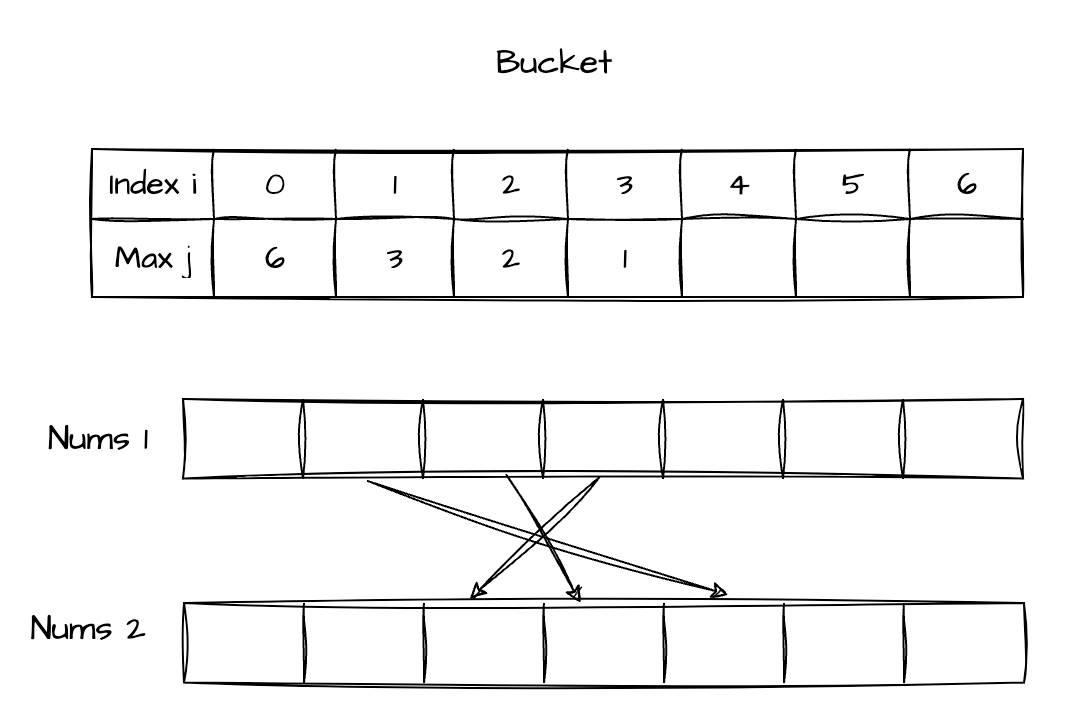Leetcode-373:Find K Pairs with Smallest Sums
Find K Pairs with Smallest Sums
Description
You are given two integer arrays nums1 and nums2 sorted in non-decreasing order and an integer k.
Define a pair (u, v) which consists of one element from the first array and one element from the second array.
Return the k pairs (u1, v1), (u2, v2), ..., (uk, vk) with the smallest sums.
Example 1:
Input: nums1 = [1,7,11], nums2 = [2,4,6], k = 3
Output: [[1,2],[1,4],[1,6]]
Explanation: The first 3 pairs are returned from the sequence: [1,2],[1,4],[1,6],[7,2],[7,4],[11,2],[7,6],[11,4],[11,6]Example 2:
Input: nums1 = [1,1,2], nums2 = [1,2,3], k = 2
Output: [[1,1],[1,1]]
Explanation: The first 2 pairs are returned from the sequence: [1,1],[1,1],[1,2],[2,1],[1,2],[2,2],[1,3],[1,3],[2,3]Constraints:
1 <= nums1.length, nums2.length <= 105-109 <= nums1[i], nums2[i] <= 109nums1andnums2both are sorted in non-decreasing order.1 <= k <= 104k <= nums1.length * nums2.length
Thoughts
Precondition
- Non-Decreasing Order:
nums1andnums2both are sorted in non-decreasing order.` - 1 <= k <= nums1.length * nums2.length
Thoughts
- 🆗 Violently Iterates: Viable but not recommend.
- 🤔 Binary Search?
- 🤔 Math Formula or Intuition? May work.
- 👍 Dynamic Programming? May work
Solution
Iterate (Optimized)
Seeing two index as (i, j), for already confirmed point, N(i) as the max selected j for current i, I , J as the collections of indexes of nums1 and nums2.
Core:Think of two logic intuitions:
- Non-Decreasing Order: For m-th point, the point is:
Optimize:
- If (i, j) is not reached, then it will also not reach point (i + 1, j), as:
Logic Intuition
To better understand the possible point location, consider followed example.

Step
- Init buckets to hold the max selected
jindex for eachiindex. - Init the first point (0, 0)
- For the rest, iterates the possible next point for each
iindex, followed by the logic above. Record the point which has minimum value and update the dp bucket. To the end...
class Solution {
public List<List<Integer>> kSmallestPairs(int[] nums1, int[] nums2, int k) {
// Init default value of buckets
int[] dp = new int[nums1.length];
for (int i = 0; i < dp.length; i++) {
dp[i] = -1;
}
// Init first element
List<List<Integer>> res = new ArrayList<>();
List<Integer> temp = new ArrayList<>();
temp.add(nums1[0]);
temp.add(nums2[0]);
dp[0] = 0;
res.add(temp);
// Dynamic Programming
for(int n = 1; n < k; n++) {
temp = new ArrayList<>();
int min = Integer.MAX_VALUE;
int minI = 0;
int minJ = 0;
for (int i = 0; i < nums1.length; i++) {
if (dp[i] < nums2.length - 1 && nums1[i] + nums2[dp[i] + 1] < min) {
min = nums1[i] + nums2[dp[i] + 1];
minI = i;
minJ = dp[i] + 1;
}
if (i - 1 > 0 && dp[i - 1] == -1) {
break;
}
}
temp.add(nums1[minI]);
temp.add(nums2[minJ]);
res.add(temp);
dp[minI] = minJ;
}
return res;
}
}Optimization
Pay attention to optimization here.
if (i - 1 > 0 && dp[i - 1] == -1) {
break;
}It reduces the unnecessary iteration for current point, because of intuition before:

Time Complexity: Unknown...
Space Complexity: Unknown...
Heap (Copy)
Core: Heap will auto-resort contained elements, so we just need to push candidate points to the heap, and just poll them.
Violent
Becasue unknown of selected the possible point, so we push all elements in the heap. And then, we just need to take the first k numbers
class Solution {
public List<List<Integer>> kSmallestPairs(int[] nums1, int[] nums2, int k) {
int n = nums1.length, m = nums2.length;
var ans = new ArrayList<List<Integer>>(k); // 预分配空间
var pq = new PriorityQueue<int[]>((a, b) -> a[0] - b[0]);
for (int i = 0; i < n; i++) {
for (int j = 0; j < m; j++) {
pq.add(new int[]{nums1[i] + nums2[j], i, j});
}
}
int i = 0;
while(i++ < k) {
int[] p = pq.poll();
ans.add(List.of(nums1[p[1]], nums2[p[2]]));
}
return ans;
}
}- N: nums1.length
- M: nums2.length
Time Complexity:
- build the heap costs
- Poll one element from heap costs
Space Complexity:
Result: Overtime ❌
Optimize
The problem of Viloent Method is that we are unable to control which points to push. So we should try to do with that.\
Simulation
- For the first, (0, 0), definitely push into heap. And we can poll it.
- Next, we get choices,(0, 1) or (1, 0). So we just push both of them
- Then, we get more choices
- if we poll (0, 1), then res is (0, 2) (1, 0)
- if we poll (1, 0), then res is (0, 1) (1, 1)
- ...
- Converting to think reversely, if we got to push (i, j), then we have to poll (i - 1, j) or (i, j - 1). So we need to ensure that when we poll one of the two points, (i, j) will be pushed into the heap.
Note: There may have repeated points when doing that, because we will push (i, j) when polling (i - 1, j) and (i, j - 1)
So there should be some distinct-strategy
Distinct Strategy
Assume that
- when polling (i, j - 1), push (i, j)
- when polling (i - 1, j), do nothing
But this may induce new problem: if we just push (0,0) at first, we will only get (0, 1) (0, 2)... such points. Because we won’t push (i, j) when polling (i-1, j). So we have to handle this problem
Solution: push all the (i, 0) points at first.
Code
class Solution {
public List<List<Integer>> kSmallestPairs(int[] nums1, int[] nums2, int k) {
int n = nums1.length, m = nums2.length;
var ans = new ArrayList<List<Integer>>(k); // Pre assign space
var pq = new PriorityQueue<int[]>((a, b) -> a[0] - b[0]);
for (int i = 0; i < Math.min(n, k); i++) // Note range judge
pq.add(new int[]{nums1[i] + nums2[0], i, 0});
while (!pq.isEmpty() && ans.size() < k) {
var p = pq.poll();
int i = p[1], j = p[2];
ans.add(List.of(nums1[i], nums2[j]));
// Note range judge
if (j + 1 < m)
pq.add(new int[]{nums1[i] + nums2[j + 1], i, j + 1});
}
return ans;
}
}
// Author:灵茶山艾府
// Link:https://leetcode.cn/problems/find-k-pairs-with-smallest-sums/solutions/2286318/jiang-qing-chu-wei-shi-yao-yi-kai-shi-ya-i0dj/
Time Complexity
- each time cost
Space Complexity
Summary
- When dealing with sorting problem(eg, find the max k numbers...), we can think of the heap.